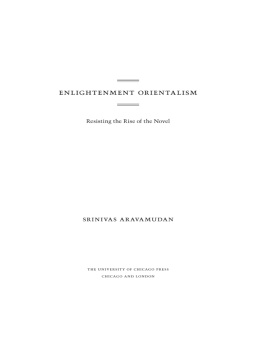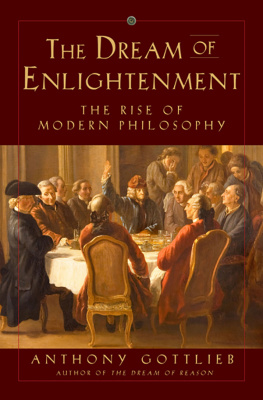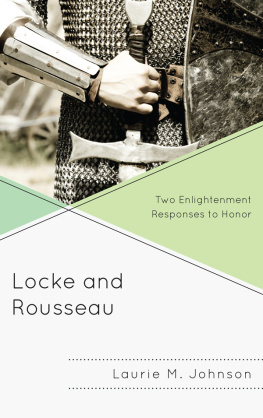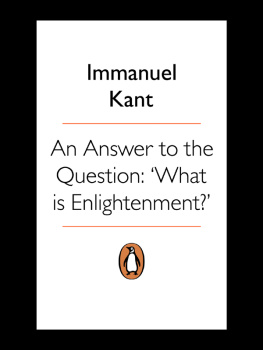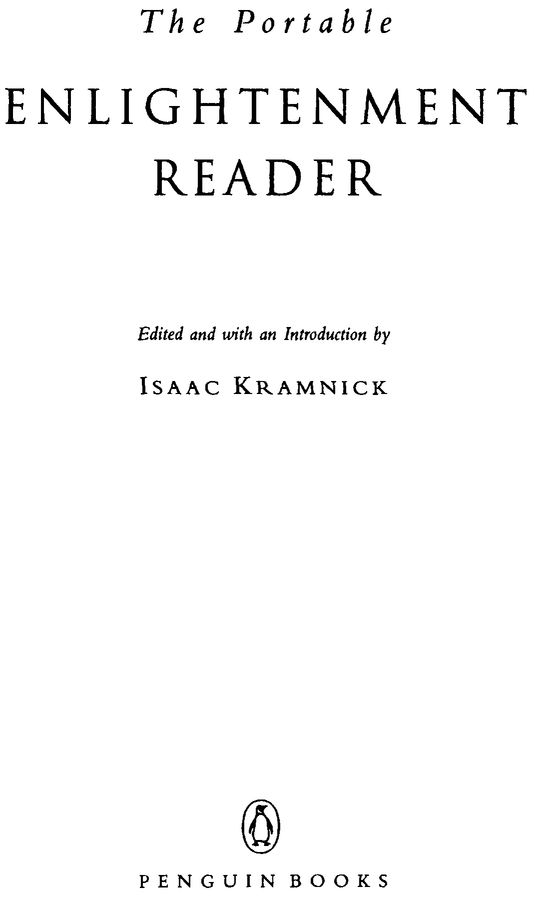Table of Contents
THE VIKING PORTABLE LIBRARY
ENLIGHTENMENT READER
ISAAC KRAMNICK was bom in 1938 and educated at Harvard University, where he received a B.A. degree in 1959 and a Ph.D. in 1965, and at Peterhouse, Cambridge. He has taught at Harvard, Brandeis, Yale, and Cornell, where he is now professor of government. He is married to Miriam Brody and lives in Ithaca, New York. Among his publications are Bolingbroke and His Circle, The Rage of Edmund Burke, and numerous articles on eighteenth-century topics. He has edited The Federalist Papers, William Godwins Enquiry Conceming Politital Justite, Thomas Paines Common Sense, and the Thomas Paine Reader for Penguin Classics. Most recently he is the author, with Barry Sheerman, M.P., of Laski: A Life on the Left.
Each volume in The Viking Portable Library either presents a representative selection from the works of a single outstanding writer or offers a comprehensive anthology on a special subject. Averaging 700 pages in length and designed for compactness and readability, these books fill a need not met by other compilations. All are edited by distinguished authorities, who have written introductory essays and included much other helpful material.
To the Memory of Judith N. Shklar (1928-1992)
Teacher, scholar, friend: A philosophe for our age
PENGUIN BOOKS
Published by the Penguin Group
Penguin Group (USA) Inc., 375 Hudson Street, New York, New York 10014, U.S.A.
Penguin Group (Canada), 90 Eglinton Avenue East, Suite 700, Toronto,
Ontario, Canada M4P 2Y3 (a division of Pearson Penguin Canada Inc.)
Penguin Books Ltd, 80 Strand, London WC2R ORL, England
Penguin Ireland, 25 St Stephens Green, Dublin 2, Ireland (a division of Penguin Books Ltd)
Penguin Group (Australia), 250 Camberwell Road, Camberwell,
Victoria 3124, Australia (a division of Pearson Australia Group Pry Ltd)
Penguin Books India Pvt Ltd, Community Centre, Panchsheel Park, New Delhi - 110 017, India
Penguin Group (NZ), cnr Airborne and Rosedale Roads,
Albany, Auckland 1310, New Zealand (a division of Pearson New Zealand Ltd)
Penguin Books (South Africa) (Pty) Ltd, 24 Sturdee Avenue,
Rosebank, Johannesburg 2196, South Africa
Penguin Books Ltd, Registered Offices: 80 Strand, London WC2R ORL, England
First published in Penguin Books 1995
Copyright Penguin Books USA Inc., 1995 All rights reserved
Grateful acknowledgment is made for permission to reprint the following copyrighted works:
The Human Mind Emerged from Barbansm by Jean Le Rond dAlembert, translated by Stephen J. Gendzier. By permission of Scephen J. Gendzier.
The Beautiful and Sublime from Obsenations on the Feeling of the Beautiful and Sublime by Immanuel Kant, translated and edited by John Goldthwait. Copyright 1960 The Regents of the University of California. By permission of the University of California Press.
The Rights of Woman by Olympe de Gouges from Women in Revolutionary Paris edited by Darline G. Levy, et al. 1979 by the Board of Trustees of the University of Illinois. Used with permission of the author and of the University of Illinois Press.
LIBRARY OF CONGRESS CATALOGING IN PUBLICATION DATA
Kramnick, Isaac.
The portable Enlightenment reader/Isaac Kramnick.
p. cm.
Includes bibliographical references.
eISBN : 978-1-101-12797-1
1. Enlightenment. 2. Philosophy, Modem18th century.
I. Title.
B802.K73 1995
940.253dc20 95-16720
http://us.penguingroup.com
INTRODUCTION
FEW HAVE CAPTURED the spirit of the Enlightenment, its intellectual and social agenda, as has Mozart in his operas. The Magic Flute, with its secular priests presiding over Temples of Wisdom, Reason, and Nature, is a series of variations on the triumph of light over darkness, of sun over moon, of day over night, of reason, tolerance, and love over passion, hate, and revenge. Masonic imagery and symbolism abound in the opera, as the Freemasons Mozart and his librettist, Emanuel Schikaneder, bring the disdain for superstition and mystery in church and state, which so marked this most radical of Enlightenment groups, into their musical and literary texts. Similarly, The Marriage of Figaro is a rendering of Enlightenment social ideals, a lyrical hymn to the individualistic claims of self-made assertive men who achieve their place through hard work, skill, and talent, as opposed to aristocrats who are simply born to privilege. What have you done to earn your fortune, rank, and position? Figaro asks the great nobleman Almaviva. He answers his own question: You took the trouble to get born, and no more.
It was the assumed triumph of these ideals that led the French philosopher DAlembert to call his eighteenth century lage des lumieres, the age of splendid illumination, of light and enlightenment. He and his fellow intellectuals, he assumed, would realize the project begun by the Renaissance: to lift the darkness that fell with the Christian triumph over the virtues of classical antiquity. While it is French eighteenth-century thought that is conventionally depicted as best embodying Enlightenment principles, with the writings of the philosophes and their magisterial seventeen-volume Encyclopidie given pride of place, the Enlightenment was, in fact, an intellectual movement that knew no national boundaries. The philosophes themselves saw three Englishmen as the prophets of Enlightenment, and they dedicated their Encyclopidie to Bacon, Locke, and Newton. Jefferson, an American disciple of the Enlightenment, agreed, ordering for his library in 1789 a composite portrait of the same three Englishmen. They had, he wrote to a friend, laid the foundation for the physical and moral sciences of modernity and were the three greatest men that have ever lived, without any exception.
The Enlightenment was an international movement that included French, English, Scottish, American, German, Italian, Spanish, and even Russian schools. Voltaire and Montesquieu visited England and wrote extensively about its institutions. Franklin and Jefferson visited England and France and were well connected with writers in both countries. The intellectual ferment was transnational. John Adams wrote his Defense of the Constitution of the United States of America in response to criticism from the philosophe Turgot, and Smiths Wealth of Nations was translated into French by Condorcet. Mozarts operas as Enlightenment icons epitomize the internationalism of the movement as well. The Austrian composer used Figaro, a literary invention of the Frenchman Beaumarchais, who, in addition to writing Le mariage de Figaro in 1778, had been involved in secret French munitions deals to help the revolutionary Americans. Beaumarchaiss play was immediately translated into English by Thomas Holcroft, Enlightenment novelist and close friend of Enlightenment philosopher William Godwin. Mozarts librettist for Figaro, Lorenzo da Ponte, was an Italian who lived in London in the 1790s and became, finally, a professor of Italian literature at Columbia University in New York City.
Dating an intellectual movement like the Enlightenment is never precise, but a rough guide would emphasize the hundred-plus years from the 1680s to the 1790s. The beginnings are marked in Britain by the Glorious Revolution in 1688, which provided a constitutional arrangement repudiating Stuart autocracy and ushering in religious toleration, as well as by the writings of Locke and the publication in 1687 of Newtons


